
Atlantic City needed a change. When I first moved there in 1977, casinos had just been approved. As a musician at the time, I thought there would be an opportunity to expand my horizons. But I was wrong.
The casinos only wanted book-smart musicians who could play the standards, and a rocker like me was on the outside looking in. So I did what needed to be done to support my family. I became a dealer at a casino.
But Atlantic City had been on the decline since the 1950s and when the Democratic National Convention was held there in 1964, everyone got to see how poorly the city had fared for years. The downward spiral had started. Legalized gaming was the answer, but it wasn’t completed until 1976.
It changed the city dramatically. Longtime residents were forced out. Businesses that had supported casino legalization were rolled over. The skyline of the city changed virtually overnight. One hundred years of history was obliterated.
But it did create over 50,000 jobs at one point.
Later, when I began to cover the casino industry as a trade journalist, I’d go to many areas of the country where gaming was to be legalized or had just been legalized. Again, enthusiastic residents and local businesses were behind the effort (as well as a few casino lobbyists), thinking casinos would help their communities.
I remember going to the Gulf Coast of Mississippi in the early 1990s when riverboat gambling had been approved. Biloxi was a mirror image of Atlantic City at that time — a resort that had seen better days. Tunica, Mississippi, was another vast turnaround. The community, sometimes call the “third world” of America, was completely transformed, giving desperate people jobs and hope.
The riverboat communities up and down the Mississippi River in Iowa, Indiana and Illinois all clamored for legal gaming because they needed economic revitalization and the taxes that casinos would bring.
Did gaming work for every community it entered? I’d say it did what it was expected to do in most of them: More jobs, taxes, corporate giving and community involvement.
What gaming truly did, however, is radically change the community it entered. And most of them were OK with that. There weren’t many great things left that they wanted to perpetuate, and as long as the benefits of gaming came along with it, people were willing to accept the drawbacks.
Boulder City, of course, does not have gaming. And no one here wants it, as far as I can tell. We do have two large casinos on each side of the town, so those who want to gamble can do so.
But it’s not just gaming that changes a community. All kinds of developments can change communities into something we don’t recognize.
We kind of like what we have here in Boulder City. With our slow-growth ordinance in place, we can control how much we change. The plans of some local developers to change that ordinance and build thousands of homes close to Henderson — not to mention an overly ambitious truck stop and business park — thankfully were put to rest.
We have plenty of room for expansion within our growth ordinance. But even there, we have to be careful that it’s the right kind of growth, with consequences that benefit everyone in Boulder City.
There has been some discussion of “affordable housing” for Boulder City — whatever that is. Does that mean tiny houses? Does that mean apartment developments? Does that mean the destruction of the truly affordable housing we already have in Boulder City in the trailer parks and the condo units?
Be careful what you wish for. You may get the complete opposite.
Roger Gros is publisher of Global Gaming Business magazine, the principal trade publication for the casino industry, and is a 10-plus-year resident of Boulder City.